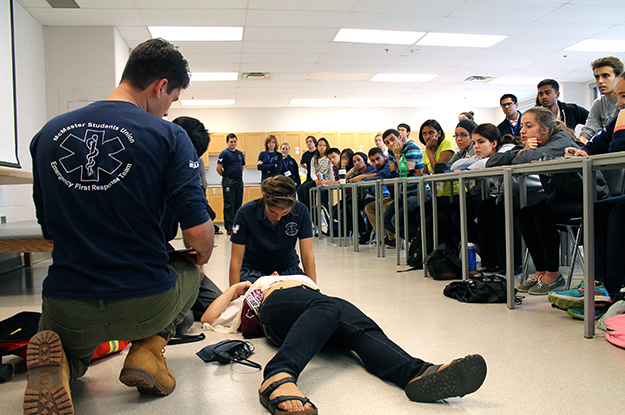EFRT student volunteers quietly celebrate 10,000 calls

'Being an EFRT volunteer requires significant dedication and commitment, with typical volunteers allotting 70-100 hours per month for running shifts and completing training,' says Chris Adams-McGavin. 'Time management is important for responders to balance school, a social life and other commitments.'
You see them pushing through busy hallways and sprinting across campus.
You see the large navy blue packs slung across their shoulders, beads of sweat collecting on their brows.
You know that time is a factor, and you always step aside.
Last November, McMaster’s Emergency First Response Team (EFRT) hit a major milestone by fielding its 10,000th call. It’s taken a little longer than expected to mark the occasion, due to the demanding nature of the unique student service.
“At the time, EFRT was busy with training and exam season was upcoming, so we waited until the new year to celebrate,” says Chris Adams-McGavin, a 21-year-old engineering student and EFRT program director.
“We celebrated with dinner and cake after our January training. There are many excellent people who have contributed to EFRT over the last 32 years who were unfortunately unable to join us, but they deserve significant appreciation for their time and dedication as well.”
EFRT is staffed by approximately 30 student volunteers like Adams-McGavin, who provide emergency medical services to the McMaster community 24 hours a day, seven days a week.
Its members, who come from all faculties and departments, are trained First Responders and Emergency Medical Responders. They have also taken additional International Trauma Life Support (ITLS) training at Toronto EMS facilities.
The service has come a long way since 1982, when undergraduate student and trained paramedic Eddie Wasser (now a physician and EFRT’s medical director) launched the innovative new program from his dorm room in McKay Hall, along with a team of 12 student volunteers. At the time, it was the first system of its kind in North America.
These days, EFRT is located in MUSC Room 203, right next to the Compass Information Centre in one of the busiest areas of campus. Volunteer team members typically field between 500-700 calls per year.
Every shift offers a whole new set of challenges. Volunteers can be called upon to treat everything from broken bones and soft-tissue injuries to heart attacks and psychiatric episodes. Some of the most common calls include sprained or broken ankles, lacerations and drug and alcohol-related illness.
Most day shifts last from 9:20 a.m to 5:20 p.m. The night shift, a gruelling 16-hour haul, begins at 5:20 p.m. and continues until the following morning at 9:20 a.m.
“Being an EFRT volunteer requires significant dedication and commitment, with typical volunteers allotting 70-100 hours per month for running shifts and completing training,” says Adams-McGavin. “Time management is important for responders to balance school, a social life and other commitments.”
Try-outs are held at the beginning of each academic year, and only the top performers make the cut. Potential recruits must have current Standard First Aid and CPR-HCP certification, and must be a McMaster undergraduate student.
Each year, between eight and 12 new members are added to the team. The first stage involves an in-depth interview and a First Aid and CPR test, which allows senior members to select 42 candidates for the second stage.
Stage two involves a weekend of additional training and guidance, followed by yet another weekend of individual and group testing involving potential real-life scenarios. Those who succeed are well prepared for the rigours of the position.
“The try-out process for EFRT is intentionally demanding, in order to prepare applicants for the stressful situations they may face as a volunteer,” says Adams-McGavin.
Think you have what it takes to join the team? Applications to join EFRT will open in September, 2015.
Place a call to EFRT:
To have an EFRT team member dispatched, members of the McMaster community can dial 88 from any campus phone, including residence phones.
The EFRT dispatcher can also be reached directly at 905-522-4135 or 905-525-9140 ext. 24281.
Follow EFRT on Twitter @McMasterEFRT.
Click below to expand. Infographic by JD Howell:



